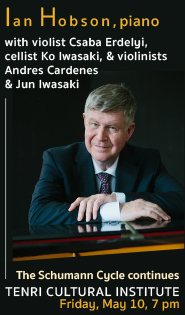MATA Festival opens with energy and irreverence
The MATA Festival has reached the age of majority, and under the current leadership of artistic director Du Yun and executive director Todd Tarantino, it continues to demonstrate a maturity that belies both its years and the age of the composers it presents.
Opening officially Tuesday night at Scandinavia House, the festival this year will present more than two dozen works from the Americas, Europe, the Middle East, and Asia, all from composers still in the early stages of their careers. Along with the geographic reach, the stylistic variety means MATA presents an unsurpassed range of contemporary music.
With such variety, and with such newness—all six works Tuesday were American premieres—the festival also courts failure. Unlike an incompetent performance of a well-known piece, failure is a necessary and valuable part of MATA. Pieces fail because of ambition, their reach exceeds their grasp, and it is that reach, more than anything else, that moves music forward.
With one exception, that was the case for Tuesday’s stimulating concert. The music was full of ideas and also some welcome humor and irreverence, and the exactitude and comprehension of the playing from Ensemble neoN, making its U.S. debut, was exemplary.
The Norwegian ensemble impressed immediately with Alexander Kaiser’s [priz(e)m], which was full of agitated energy—Kaiser’s personal response to the discovery of the NSA’s spying. The piece is highly polyphonic and skillfully written, the complex combination of multiple lines and quick jump cuts is always transparent. The piece sounds like an imaginative and smart free improvisation.
Seán Clancy’s Fourteen Minutes of Music on the Subject of Greeting Cards was entirely different. Written for flute, violin, piano, with the projection of various lines from greeting cards. The music is quiet, modest, with slow, sustained tones in the flute and violin, and equally slow, miniature phrases on the piano. The projection creates a narrative of life, from birth to death, and with the music the experience was a poignant lament.
The juxtaposition of Diego Jiménez Tamame’s Don’t condescend [Don’t even disagree] and Jan Martin Smørdal’s All Play (the first work after intermission), completed a trend that began with [priz(e)m]. Each musical era has its own terroir, and while classical music’s vines are old-growth, the topsoil is always changing, adding new flavors.
Kaiser, Tamame, and Smørdal’s pieces were all cultivated with punk and noise (all born after the Sex Pistol’s seminal U.S. tour), and with the first two composers there were noticeable hints of Hans Werner Henze and David Lang’s revolutionary Lying, Cheating, Stealing.
Where Kaiser creates vitality out of a structure that sounds like data packets bouncing through the electronic ether, Don’t condescend sounds like a dense burst of white noise, disassembled, with the parts all heading back to coalesce at a central point. The well-executed writing is full of power and gnarled timbres, but the result is heavier and more monotonous than the Tamame appears to imagine—white noise is every frequency and contains multitudes.
All Play is impressively well-made but limited by a personal perspective that is less universal than Smørdal expects. Everything is written around a performance—seen and heard on video—by a musician the composer admires, noise-improvisation guitarist Daniel Meyer Grønvold. Smørdal transcribed the sound of Grønvold’s performance, and flute, clarinet, piano, and cello accompany the video.
The composer called it a “concerto of sorts.” His technique doubles, rather than expands, the solo instrument, and produces two problematic results: one is that the timbres of the acoustic instruments are more interesting and attractive than the distortion and feedback from the electric guitar; and the other is that after Sonic Youth, et al, the argument is dated.
Neil Luck’s world premiere, Bubbles—with the composer performing as vocalist—was a near-miss. Accompanied lyrically by the instrumentalists, playing an open score, Luck gulped down draughts from a large bottle of Coca-Cola, then proceed to belch articulately into the microphone. Eventually, he managed to pop forth a lyric from the early 20th century tune “I’m Forever Blowing Bubbles.”
Taken together with his faux-pretentious program note, Luck’s piece is a sympathetic companion to Sarah Silverman’s unforgettable performance of “Amazing Grace” from her movie Jesus is Magic. But then Luck goes through a series of stagey, fake endings that wear out their welcome quickly and eventually turn brittle and somewhat sadistic. He didn’t have the stage manner to sell the tension that technique requires, but kudos for his sense of rubato as a belcher.
The concert’s finale was Matthew Welch’s Comala’s Song, another world premiere and a MATA commission. With soprano Silje Aker Johnsen joining the ensemble, the work sets poetry from James Macpherson, writing as his persona Ossian. The words spell out a drama about a love triangle involving Princess Comala of the Orkney Islands.
Welch is one of the most interesting young composers around, developing a personal and often spectacular language out of Indonesian music, traditional bagpipe music, and classical ideas. That made the unexpected smooth conservatism of Comala’s Song a major disappointment. The music in and of itself was a pleasant and often lovely song, but from a composer who consistently surprises, in the context of a festival that offers nothing but surprises, this was safe music, and felt out of place.
The 2016 MATA Festival continues through April 16, with performances at National Sawdust, Trans-Pecos, and Dixon Place. matafestival.org.








